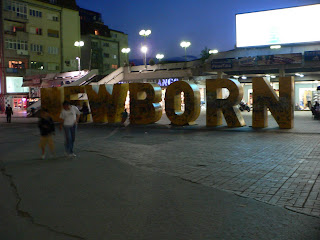My latest trip to Kyiv (the true spelling of what Russians call ‘Kiev’) was for a big international workshop for young leaders, the grand finale to the British Council programme I’d been through the past six months.
The workshop was fascinating: 85 young people from 16 different countries – mostly central and east European, as well as the UK, three Nordic countries, Turkey and Israel – gathered for three days of intercultural exchange and self discovery. The event aimed to help us build our intercultural networks, and co-develop projects that would ‘change the world’. It sounded lofty and vague, and often was, but I forced myself to go with the cheesy flow and got a lot from it. One lesson was that the British cynicism that led to my initial disdain for the slightly patronising event format was a burden, not a badge of ironic honour.
The event had an interesting relationship with national stereotypes. Of course most are based on truth and this was proven repeatedly throughout the three days. There were forthright and self-depreciating Nordics, quiet and reserved Belorussians, friendly but slightly wary Turks, baulchy Israelis, and numerous oddball central and east Europeans: one Slovenian wrote in his personal profile, published in a directory of participants that everyone received at the start, that he is "a strange person you don’t want to meet, cause I bite while moonwalking… and am easily changeable with a shaman as I play a jew’s harph”…
But the nature of the selection process meant that most people shared a lot beneath the thin veneer of their cultures, and almost everyone was fun, smart, engaging and pro-active.
The stereotypes were also a common source of fun, and I found great favour in playing up to them. In one presentation I played a BBC news reporter, donning my plummiest accent and stiffest upper lip. Everyone loved it, and afterwards I was unsure whether I’d reinforced a negative stereotype or poked fun at, and holes through, an international misconception about how reserved the Brits really are.
Day 1 ended with an intercultural fair, where each country had a stand. The Turks offered henna tattoos and belly-dancing, the Israelis offered cleansing Dead Sea mud. True to form our lacklustre British table contained an umbrella and lots of tea. But the most common (and popular) offerings were the huge shots of 50% drinks from across eastern Europe. Needless to say everyone got sloshed pretty quickly. That set the tone for the rest of the event, which involved early starts, jam-packed days, and boozy late nights. I was exhausted by the end.
My most interesting conversations were with the large Israeli contingent. Never having spoken at length to young Israelis before, I was fascinated by their opinions, values and mannerisms. The groups was disproportionately liberal yet they still often came across as rude, not least in walking out of sessions they found pointless, or shutting people off mid-sentence if they were bored by a conversation.
I spoke most with Golda, a strident and extremely sharp woman of colossal ambition. She explained that for an Israeli, walking away from dull dialogue isn’t rude, but honest and efficient. While I remained trapped in cul-de-sac conversations with nothing but my subtly negative body language to rescue me, she’d already spoken to four people. She afterwards said it’s nice that the British are so polite, to which I replied I had no choice; it’s my culture. For the first time I saw those famous and respected British manners as a cage.
Israel lives in a constant state of tension and conflict with its neighbours, so it’s not surprising that its people are so assertive, (i.e. blunt and impatient). One outcome is that they are very energetic, possibly living for the day because things are so unpredictable. Another reason why Israelis are seen as rude is possibly because, in geopolitical terms, their country is the small, spoilt rich kid on the block, enjoying the patronage of the sole hyperpower and not used to having to compromise. Now the hyperpower’s might is waning while it’s groundbreaking President is parenting Israel with a firmer hand, and they don’t know how to react.
One reason why I got on so well with the Israelis is not because they are so different from us, but so similar. We are both American satellites, at least culturally, and I was surprised at the depth of our affinity. Interesting that in a European event without a single American present, the Land of the Free can still exert such influence.





















